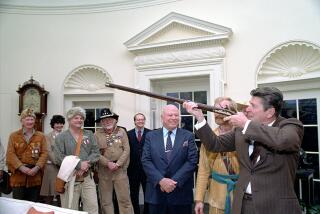Reich Says Gap Between Rich, Poor Poses Threat
- Share via
WASHINGTON — Three days after President Clinton proclaimed the nation “on the cusp” of reversing its worst social problems, his outgoing Labor secretary issued an unusually public word of caution, warning that the continuing gap between rich and poor “threatens to blight an otherwise promising future.”
With pointed references to the president’s campaign rhetoric, Robert B. Reich, a trusted member of Clinton’s inner circle and one of his administration’s more liberal Cabinet secretaries, reminded Clinton on Thursday not to overlook the “unfinished agenda” created by inequality within the U.S. economy.
“The bridge to America’s future must first traverse the chasm of inequality,” Reich said. “As we congratulate ourselves, justifiably, for renewed growth and a diminished deficit, we must recognize that our circumstances allow us to take up the unfinished agenda. Our circumstances allow it and our consciences compel it.”
Reich’s forthright comments were consistent with his tenure in the administration, when he often seemed ahead, or often to the left, of the White House.
Many of his ideas--notably a call for changes in the tax code that would reward “corporate responsibility”--sparked opposition within the administration and led the White House to distance itself from his views at times. But other initiatives he advanced at politically unpopular moments eventually came to pass--most notably the minimum-wage increase approved last year.
The Clinton administration took Reich’s reminder in stride. “I haven’t heard anybody bothered by it,” said White House spokeswoman Mary Ellen Glynn. “Secretary Reich is a good friend of the president. . . . Everybody here is aware of his views and practically knows what he is going to say.”
Clinton told a group of religious leaders Monday that for the first time in 20 years, income inequality between wealthy and poor working Americans shrank in 1995. While Clinton pointed to the new statistic as one of several indicators that the nation is addressing its most pressing social problems, Reich’s comments quickly cast doubt on the significance of the figure.
Reich’s comments reflect a trend chronicled by labor economists for several years: the income gap between rich and poor Americans that had grown steadily for 25 years.
Between 1979 and 1995, said Reich, the poorest one-fifth of Americans saw their incomes decline by 9%, while the incomes of the richest one-fifth grew by 26%. Reich drew a stark contrast between the most recent period and the 1950-78 period, when all income groups saw relatively even growth and the poorest one-fifth saw their incomes grow most significantly.
While few agree on what government can or should do to reduce the income gap--or indeed, whether it needs to be reduced--most agree on the causes. Among them are increased global competition, the loss of U.S. manufacturing jobs and the decline in the proportion of American workers who belong to unions.
Reich, who is leaving his post to spend more time in Boston with his two teenage sons, suggested that a broader cultural shift also has played an important part. He suggested that government must do something to restore an “implicit social compact” which held, among other things, that thriving companies should pass some of their prosperity on to workers and offer them a substantial measure of job security in return for helping make the company a success.
One of the easiest and most controversial ways to lessen disparities between the rich and poor is to use the tax code to redistribute wealth. But Reich took pains to avoid a partisan firestorm by suggesting major changes in tax policy.
The “social compact” that must be restored, he said, “was not about redistributing wealth. There would still be rich and poor. It merely proclaimed that at some fundamental level we were all in it together, that as a society, we all depended on one another.”
At the least, he said, the administration should follow the rule of “do no harm,” steering clear of steps that would worsen income gaps among Americans.
In seeking to avoid larger income gaps, Reich warned, the administration will face its most serious perils as it seeks to balance the budget and to ensure that the Social Security and Medicare systems do not collapse under financial strain.
In considering ways to replenish the Social Security and Medicare trust funds, Reich said, the administration should avoid several fixes that are being widely touted.
Meeting with reporters before his speech to the Council on Excellence in Government, Reich argued strongly against raising payroll tax rates--a step that would disproportionately affect middle- and low-income workers, he said. He also cautioned against calls by some Republicans and business groups to allow people to take part of their Social Security funds and invest them in private accounts. That too, he said, would aggravate income inequality.
Times Washington bureau chief Doyle McManus and staff writer Elizabeth Shogren contributed to this story.
More to Read
Get the L.A. Times Politics newsletter
Deeply reported insights into legislation, politics and policy from Sacramento, Washington and beyond. In your inbox twice per week.
You may occasionally receive promotional content from the Los Angeles Times.











